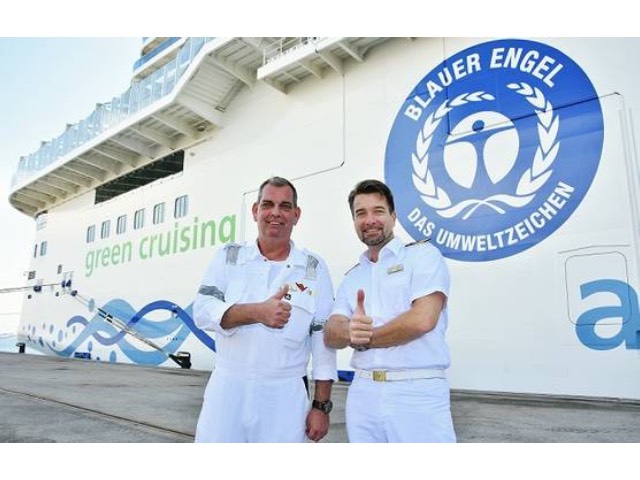In the latest edition of “AIDA Cares”, the company reports further progress on the way to the first emission-neutral ship in 2030. An important milestone was reached with the commissioning of AIDAnova, the world’s first LNG cruise ship. The first use of fuel cells and batteries on board is planned for 2021.
“With our green cruising strategy, we have been pursuing the long-term goal of emission-neutral cruises for many years. In addition to the use of liquefied natural gas (LNG), we are already researching the use of emission-neutral fuels, e.g. from renewable energies. We are committed to the further expansion of shore power supply, not only in Hamburg, Rostock and Kiel, but also in other destinations. The use of batteries on board AIDAperla and fuel cells on AIDAnova is planned for 2021. Together with partners from science, business and politics, we will develop innovative answers to important questions about the future. Our goal is to put the first emission-neutral ship into service in 2030”, said Felix Eichhorn, President AIDA Cruises, on the occasion of the publication of the current sustainability report.
In the fiscal year 2019, AIDA Cruises once again made a technological leap towards emission-neutral cruising by commissioning AIDAnova, the world’s first LNG cruise ship, awarded the German federal government’s Blue Angel seal in recognition of its environmentally friendly ship design.
After a year, AIDA Cruises draws an initial positive balance: Thanks to the new ship design, the use of LNG and other measures to reduce energy consumption in the hotel, catering and leisure sectors, the CO2 emissions per person and day on board AIDAnova could be reduced by around 55 percent to 27 kg in 2019 compared to the fleet average emission (59.8 kg) in the fiscal year 2018.
For comparison: According to the myclimate foundation’s CO2 calculator, a commuter between Hamburg and Bremen is with his car responsible for emitting around 80 kg of CO2 every day.
Careful use of resources is another elementary pillar of AIDA Cruises’ commitment to sustainability. 31 percent less plastic waste and 15 percent less food waste per person and day on board compared to the previous year are the result of a large number of initiatives and processes, which have been implemented in 2019.
The water consumption per person and day on board decreased in the same period by around 6.8 percent.
At the same time, AIDA Cruises expanded its commitment to protecting the vital resource of fresh water. In 2019, the in-house production rate from seawater on board reached already 86 percent.
For AIDA Cruises, responsible management also means creating lasting values. The company therefore always focuses on the sustainable economic development of the destinations.
In 2018, AIDA Cruises’ commitment in Europe alone stood for an annual economic impact of around 5.3 billion euros and the safeguarding of 27,000 jobs. In Germany, AIDA Cruises made the largest overall economic contribution with 3.4 billion euros, whereof 1.6 billion euros were generated exclusively in northern Germany. This commitment stands for the creation and safeguarding of more than 15,600 full-time jobs (direct, indirect and induced).
AIDA Cruises works with more than 2,600 suppliers (excluding shipbuilding) throughout Germany, around 350 suppliers are based in Mecklenburg-Western Pomerania. In addition, more than 12,000 travel agencies were part of our network of sales partners in 2019. At the Meyer shipyard in Papenburg (Germany), AIDAcosma is currently not only the second LNG cruise ship under construction, but also the eleventh AIDA ship to be built in Germany.
Sharing success – this attitude is also firmly anchored in the corporate culture of AIDA Cruises. In 2019, the national and international social and cultural engagement was pooled under the umbrella of AIDA Cruise & Help. The focus lies particularly on improving the future prospects of children and young people by building schools in emerging and developing countries. A total of eight projects were already financed in the fiscal year 2019. The first school opened in May 2019 in Cebu, Philippines. Others followed, for example in Nepal, Haiti, India and Indonesia. This year, the company has continued its commitment and has already initiated six more school projects, for example in Namibia and Madagascar. Additionally, the company supported various charitable and cultural projects in Germany.
“With regard to all major future topics, we can only achieve something together. The dialogue with society, politics and science and the joint search for solutions are an important key for us, both in overcoming the current challenges by the COVID-19 pandemic, as well as in the gradual transformation of our industry on the path to climate-neutral cruising”, said AIDA President Felix Eichhorn.









































